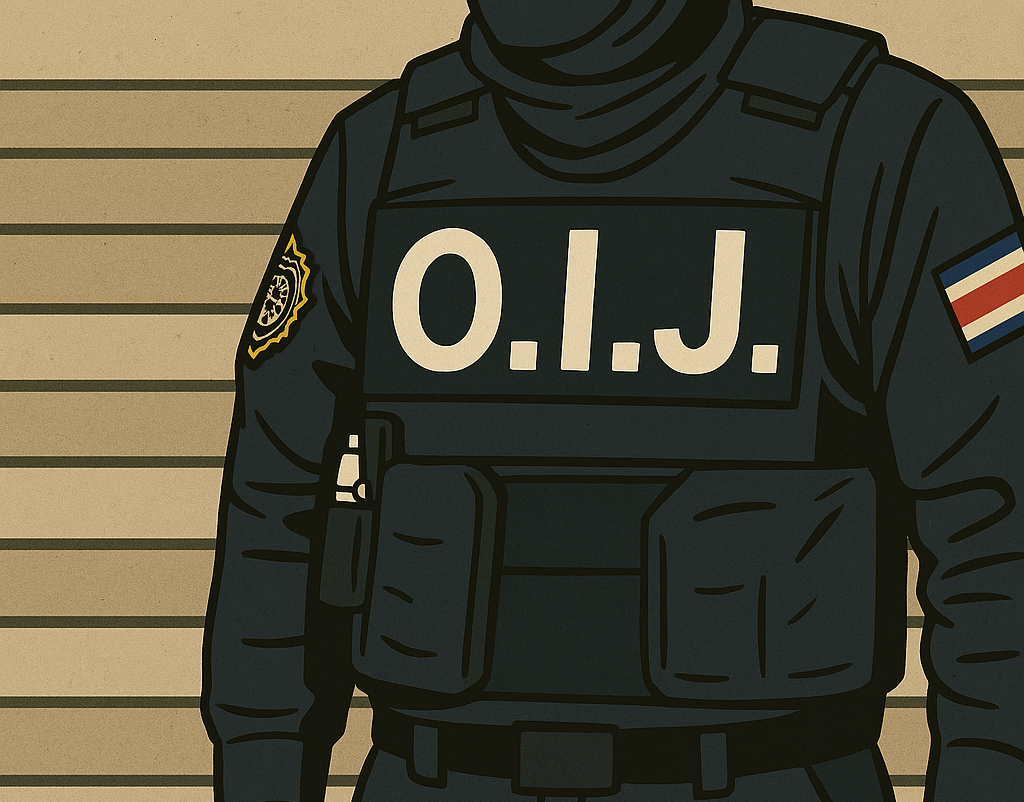Security has become a central topic of conversation in Costa Rican society. We have gone from proudly showcasing our exemplary safety levels—compared to other countries in the region—to longing for the progress made by our sister nation, El Salvador. Once considered the most unsafe country in the region, and looking to Costa Rica as a model, El Salvador now stands as a reference point for radical change.
According to a survey by the Center for Research and Political Studies of the University of Costa Rica (CIEP), 43.7% of respondents identified insecurity as the country’s main problem. This marks a 15.9% increase compared to the 2023 result of 27.8%. It begs the question: what changes has Costa Rican society experienced to trigger such a sudden shift?
In 2023, nearly 70% of reported crimes were linked to acts of vengeance and score-settling—types of violence deeply connected to organized crime, according to the 2024 State of the Nation report. While some may argue these figures only concern those involved in criminal groups, the reality is that victims often include family members and innocent civilians caught in the wrong place at the wrong time. The cost may be paid by the debtor, but also by a child, a pregnant woman, or an honest man who unknowingly finds himself near the target of retribution. This is the painful reality Costa Ricans face.
Beyond organized crime—an undeniably complex and layered issue—reports from the Judicial Investigation Bureau (OIJ) offer alarming data. In 2024, the OIJ received 112,020 complaints, an increase of 1,892 compared to 2023’s 110,128. This is the highest number of reports in recent years and the past decade. These crimes range from property violations and violence against life to disappearances of minors and adults. These realities affect everyday Costa Ricans: the worker who is assaulted, the family whose home is ransacked, the individual whose bank account is emptied.
In light of this panorama, the question arises: how can we improve national security? There are two dominant viewpoints. On one side, advocates for replicating the Salvadoran model under President Nayib Bukele in Costa Rica. On the other, critics who consider such an approach regressive on human rights and borderline dictatorial. A 2024 OPOL poll revealed that 85.7% of respondents are familiar with the Salvadoran president, and of these, 81.4% have a positive opinion—suggesting many may favor similar measures in Costa Rica.
However, there is documented injustice within the Salvadoran model. While the reduction of insecurity in El Salvador is undeniable and deserves recognition, cases of innocent individuals imprisoned without trial under the state of exception cannot be ignored. An estimated 8,000 civilians have been detained based on tattoo markings, anonymous reports, or other vague associations not necessarily linked to gangs. A prominent case is that of Ruth López—a human rights lawyer—who has documented such abuses and was recently detained without conclusive evidence. In a video circulating on social media, López demands a public trial under the belief that “he who owes nothing has nothing to fear.”
This article does not aim to endorse or reject any specific security model. The drop in crime in El Salvador has merits that should be acknowledged. But more importantly, it invites reflection: what direction do we want Costa Rican society to take? How will we tackle the pressing security issue? What are we willing to sacrifice to achieve it? And above all, are we truly understanding the roots of the problem?
Insecurity doesn’t emerge overnight—it’s a multidimensional and structural phenomenon. No single administration can be held solely responsible for its rise; it’s a problem decades in the making within Costa Rica’s institutional framework. Its current scale has overwhelmed us, and we’re unsure how to eradicate it—or at least reduce it gradually. The causes are tied to the country’s employment opportunities, educational systems and curriculum, and how we address challenges facing Costa Rican youth. If these underlying issues go unaddressed, they will continue to fuel organized crime and deepen national insecurity.
Liberal philosopher John Locke asserted that punishment must be proportionate to the offense, aimed at repairing harm and deterring future crimes. Yet this goal seems distant in Costa Rica’s penal system, which neither seeks to rehabilitate the offender nor efficiently prevent crime. Instead, it often resembles a network of care and permissiveness. We must ask ourselves whether we want a model that reduces insecurity at the cost of liberty and fosters avoidable injustices due to the absence of fair trials.
The Salvadoran model offers valuable lessons—but also aspects that require improvement. As a society, we must resist punitive populism and adult-centric paradigms, as warned by security expert Tania Molina Rojas in her book Futuro Secuestrado, which analyzes insecurity through a multidimensional lens. We need to create spaces where experts can compare successful global models, identify areas of improvement, and draft legislation tailored to Costa Rica.
It’s also vital to pay attention to the security proposals from future presidential candidates and their congressional teams. If their plans guarantee safety without compromising freedom, we must bring them into serious debates where real, context-sensitive solutions can be presented. We can learn from our Salvadoran neighbors and other successful models abroad—while improving unjust elements—to promote liberty, peace, and development in Costa Rica and the wider region.
By Fernando Ulloa
Program Director – IPADES


